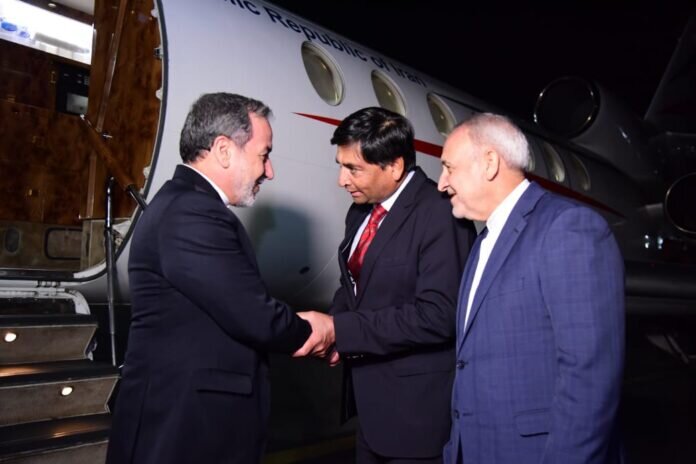Tehrans diplomatic strategy
Tehran’s diplomatic strategy
ISLAMABAD – Ahead of the conference in Saudi Arabia on Gaza and Lebanon, Iranian Foreign Minister Abbas Araghchi’s visit to Pakistan held significant importance for Pakistan.

During his visit, I had the opportunity to meet him. Given the proximity of Pakistan and Iran and the overlap of interests on many issues, it’s always valuable to analyze the objectives of Iran's leadership when they visit Pakistan. However, this visit took on heightened importance due to the ongoing Israeli aggression in Gaza and Lebanon and the direct tensions with Iran. Understanding Iran’s stance at the time on these issues became critical.
At the time of our meeting, the U.S. presidential election results were still unknown, and it was uncertain what approach the next U.S. administration might take on various matters. Nonetheless, the Iranian foreign minister made it clear that the situation in America was of little concern to Iran.
He maintained a strong political stance, asserting that Iran is indifferent to who gains or loses power in the U.S. For Iran, either outcome would likely bring the same result: continued U.S. hostility toward Iran.
Because he had this bold political stance that Iran doesn't care who takes over power in America and who faces defeat. For Iran, the coming to power of either of them has the same meaning that both of them will adopt a policy of hostility towards Iran.
The Iranian foreign minister said regarding the recent severe tension between Israel and Iran and the possible spread of this fire that Iran knows very well that the real problem in war is whether the preparation is complete or not.
Iran has completed all kinds of preparations regarding a possible war with Israel and if Israel does something stupid, in such a situation, Iran is ready to give the strongest response to it.
The foreign minister said that the real strength of Iran is those martyrs who have laid down their lives for the defense of their country. Regarding Iran, he also rejected the idea that Iran is alone in the world.
The Iranian president is going to visit Moscow soon and the most important development expected in this visit is that Iran and Russia will sign a 25-year defense cooperation agreement. And this agreement will be of the same nature as the one between Iran and China a few years ago. Then Iran is feeling very happy with Pakistan's role in this whole situation. The stance taken by the Pakistani government and the Pakistani establishment regarding the issues of Gaza and Lebanon as well as Iran has actually exceeded their expectations.
Also, efforts are underway to improve relations between Iran and Saudi Arabia. With Trump’s nomination in the U.S. elections, there had been concern in the Arab world that his return to office would bring unpredictable policies. About a month ago, I asked an Arab friend why the foreign ministers of the Persian Gulf countries had recently met with the Iranian foreign minister in Doha, Qatar. While Iran faces the threat of a direct conflict with Israel, I wondered what concerns were driving the Arab world at this point. My friend smiled and said that their worry is growing—and it’s the possibility of Trump’s success.
The Arab world has not yet come out of the effects of Trump's public address in which he addressed the Saudi king and said that if we do not protect you, you cannot remain in power for two weeks. Such a statement of the President of the United States at the public level was a big blow and because of this, China got an opportunity to play its role in restoring the diplomatic relations between Iran and Saudi Arabia. The Arab world is completing its preparations to deal with any possible situation and we are not alone.
That is why Saudi Foreign Minister Prince Faisal bin Farhan said last week that “We are having very, very clear and honest conversations with the Iranians. “And it seems that this sincerity is having some positive effect.”
The presence of the Saudi armed forces chief in Tehran, along with his meeting with the Iranian army chief and Iran’s invitation for Saudi Arabia to participate in joint naval exercises, signals a positive shift.
Most notably, in his opening remarks at the Riyadh Conference, Saudi Crown Prince Mohammed bin Salman stated, “We call on the international community to compel Israel to respect Iran’s sovereignty and not to attack its territory.” This statement from Saudi Arabia sends a clear message that tensions between Iran and Saudi Arabia have eased, and this message resonates not only with Israel but with the broader international community.
If Iran and Saudi Arabia can resolve their differences through meaningful negotiations during this time of severe conflict in Gaza and Lebanon, and prioritize a common stance over regional dominance with addressing key issues surrounding Hamas, Hezbollah, and Yemen's Ansarullah, the two nations could then be able to present a united front that would strongly counter Israeli aggression in Gaza and Lebanon.
This cooperation could also reduce the broader threats facing both Iran and Saudi Arabia. Now, it remains to be seen how effectively these two countries will approach the matter with mutual understanding.
source: tehrantimes.com